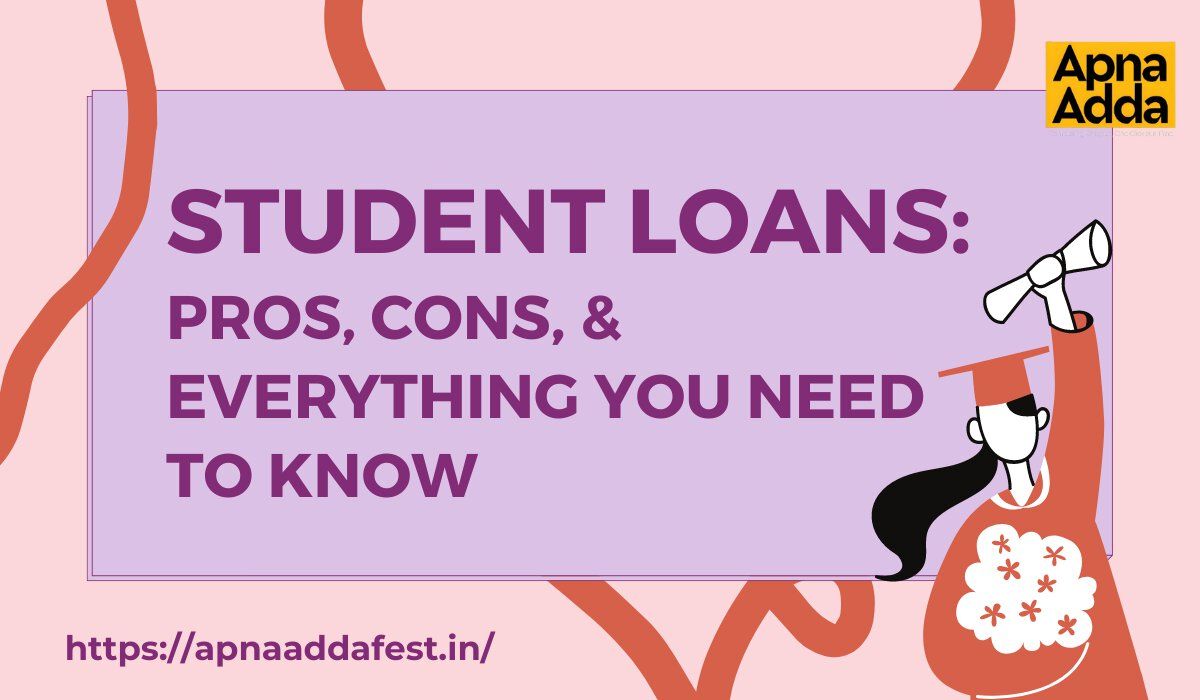Smart Borrowing: The Ultimate Guide to Student Loans - Pros, Cons and everything you need to know

Student loans can be a relatively easy and inexpensive way to finance your college education. It can act as a significant decision that can shape your future. However, it’s essential to weigh the pros and cons before making a decision.
Let’s explore the reality of student loans...Here's anything and everything you might want to know about student loans.
Table Of Contents:
Introduction
Student loans—those two words can evoke a mix of emotions: hope, anxiety, and sometimes even dread. As we navigate the path toward higher education, it’s essential to understand the nuances of student loans. For some, it can be a blessing, unlocking the door to higher education, while for others, it can be a burden to overcome, requiring them to navigate many challenges.
Education loans are essential for covering financial obligations while studying in colleges, both in India and abroad. These loans come with a moratorium period and an extension of one to two years for repayment. While undergraduates need not undergo a credit check, parents and guardians must qualify based on their income and collateral kept as security.
The Pros of Student Loans

Affordability and Access
- At private colleges and universities abroad, accommodation and living costs have skyrocketed. For most students who aspire to study abroad, affording college without student loans is nearly impossible.
- Student loans bridge the gap, making higher education accessible to millions of students each year.
- Without them, our dream of attending college might remain just that—a dream.
Choice and Aspirations
- Student loans can be the difference between an okay school and our dream school.
- That prestigious university (University of Oxford, Harvard University, University of Cambridge, Stanford University, etc.)? Student loans might make it a reality.
Beyond Tuition
- Student loans cover more than tuition; they handle textbooks, housing, and more.
- They help us manage the full college experience.
- So, it is not just the fees that would be included in the loan but all other expenses.
Building Credit
- Responsible repayment of student loans establishes good credit.
- It’s a stepping stone towards financial stability.
- Students understand the seriousness of them stepping out of their homes and studying.
Expenses Covered By Student Loans
Tuition Costs
- Tuition fees constitute a significant portion of a student’s education expenses.
- All education loan lenders cover tuition fees, regardless of whether they are NBFCs, public banks, private banks, or international lenders.
Living Expenses
- Living expenses include various day-to-day costs associated with life abroad.
- These expenses cover accommodation, utility bills, food, and travel.
- However, there’s no uniformity in how living expenses are covered. Lenders often set a limit on monthly living expenses as a percentage of the total loan amount.
Health Insurance
- Most universities abroad require students to have health insurance.
- Many education loan lenders cover the costs of health insurance, but it’s essential to check with your specific lender.
Travel Expenses
- Traveling abroad can be a considerable expense.
- Some banks include travel costs in their education loan coverage, allowing you to keep your savings intact.
- Remember to explicitly request this inclusion if it’s not part of the default loan terms.
Other Study-Related Expenses
- Beyond tuition, there are additional study-related costs.
- These include buying books, library subscriptions, field visits, and other academic necessities.
- Many education loan vendors cover these costs as well.
Sources That Provide Student Loan
If you’re a student in India seeking a student loan, there are several options available to you.
Bank
- Many nationalized, private, and cooperative banks in India offer student loans. These loans can be used for various educational purposes, including tuition fees, accommodation, books, and other related expenses.
Non-Banking Financial Companies (NBFCs)
- NBFCs such as Tata Capital, Avanse Financial Services, and Credla (a subsidiary of HDFC Bank) specialize in providing loans specifically for students in India.
- These institutions often have tailored loan products with competitive interest rates.
Government Banks
- Government banks are a popular choice among students due to their subsidized interest rates. These banks offer education loans for both domestic and international studies.
Private Banks
- Private banks also provide education loans. While their interest rates may be slightly higher than those of government banks, they often offer more flexible terms and personalized services.
Nationalized Banks
- Nationalized banks have a wide network and offer education loans to eligible students. They consider factors such as creditworthiness, income, and collateral when processing loan applications.
Online Lending Platforms
- Some online platforms facilitate student loans. These platforms connect borrowers with lenders and streamline the application process.
However, remember to check the eligibility criteria, interest rates, repayment terms, and required documents for each option. It’s essential to compare different lenders and choose the one that best suits your needs.
Indian Universities are eligible for student loans.
Here’s a list of universities in India that are eligible for student loans:
- Indian Institute of Management (IIM), Ahmedabad.
- Indian Institute of Management (IIM), Bangalore.
- Indian Institute of Management (IIM), Calcutta.
- Indian Institute of Management (IIM), Indore.
- Indian Institute of Management (IIM), Indore-Mumbai Campus.
- Indian Institute of Management (IIM), Kozhikode.
- Indian Institute of Management (IIM), Lucknow.
- Indian Institute of Management (IIM), Lucknow-Noida Campus.
- Indian School of Business (ISB), Hyderabad.
- Indian School of Business (ISB), Mohali.
- Xavier Labour Relations Institute (XLRI), Jamshedpur.
- Birla Institute of Technology & Sciences (BITS), Pilani.
- BITS (Pilani)—Goa Campus.
- BITS (Pilani): Hyderabad Campus.
- Indian Institute of Corporate Affairs (IICA), Manesar.
- Indian Institute of Foreign Trade (IIFT), Delhi.
- Indian Institute of Foreign Trade (IIFT), Kolkata.
- Indian Institute of Management (IIM), Amritsar.
- Indian Institute of Management (IIM), Bodhgaya.
- Indian Institute of Management (IIM), Jammu.
- Indian Institute of Management (IIM), Kashipur.
This is not an exhaustive list, and there are many more institutions eligible for student loans in India. These are just some universities which are in the lists of mostly all the banks. You would have to explore additional resources or consult with specific banks or financial institutions for further details.
Documents Required For Taking Student Loan
When applying for a student loan in India, you’ll need to provide the following mandatory documents to the banks:
- Duly filled and signed application form with affixed photographs.
- Two recent photographs.
- Copy of exam mark sheets from your 10th and 12th grades or the latest education certificate.
- Statement of course expenses or cost of study.
- Aadhar Card and PAN Card of both the student and the parent or guardian.
Additionally, different banks may have specific requirements, so it’s advisable to check with the bank where you plan to apply for the student loan.
The Cons of Student Loan

Debt Burden
- Starting life with debt isn’t ideal.
- Student loans can feel like a heavy backpack into adulthood.
Interest Accumulation
- Student loan interest compounds daily. For instance, if you graduate with an average debt of $29,800 at an annual interest rate of 5.8%, the day after graduation, you’d owe an additional $4.74, and this snowballs daily.
- Over the expected 10-year repayment period, you’ll pay at least an additional $9,600 in interest.
Deferred Life Goals
- Paying off loans often means postponing other goals—buying a home, starting a family, or travelling.
- It’s a trade-off we must consider.
The Unyielding Debt
- Unlike other debts, student loans stick around.
- Even during rough patches, they won’t vanish.
Credit Score Woes
- Defaulting on student loans can tank our credit score.
- It’s a slippery slope we want to avoid.
Remember, while education is essential, it’s crucial to explore alternative funding options and minimize reliance on loans to secure a brighter financial future.
Conclusion
In conclusion, navigating the world of student loans can be both daunting and essential for many individuals pursuing higher education. Remember that student loans are a means to an end—a way to invest in your education and future. Approach them with caution, seek guidance when needed, and prioritize financial literacy.
By making informed choices, you’ll be better equipped to manage your student loans and pave the way toward a successful academic and professional journey. Good luck with your education financing.
For more interesting and exciting updates about your college and upcoming fests, stay tuned to Apna Adda!

